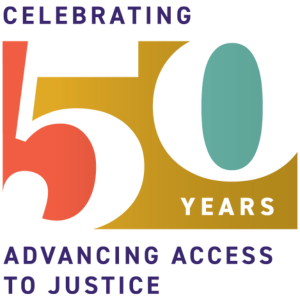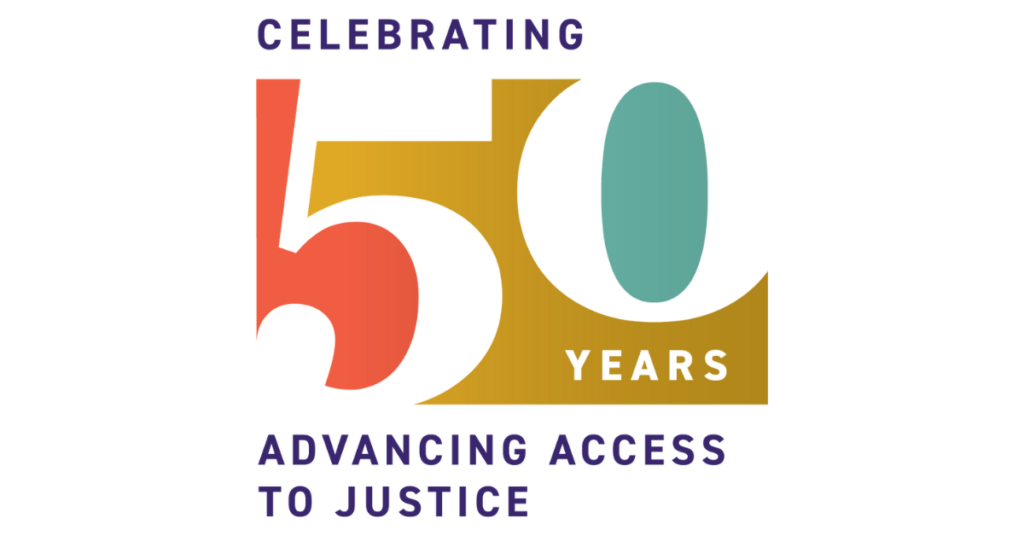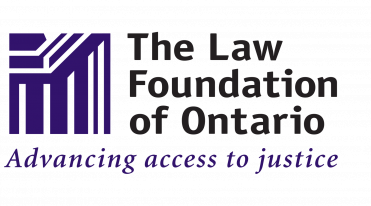From “good purpose” to Growing Possibilities
A “good purpose”: why we began
The Law Foundation of Ontario turned the big 5-0 in 2024. It’s a significant milestone in our access to justice journey and a fine opportunity to reflect on our first 50 years.
Our origin story begins in the late 1960s. A group of Benchers (i.e. Board members) at the Law Society of Ontario (then called the Law Society of Upper Canada) were inspired by the innovative and altruistic actions of their peers in New South Wales, Australia and British Columbia who had established the first law foundations in the world (1967) and in Canada (1969).
Law foundations are unique. Our revenue comes from the interest earned on lawyers’ and paralegals’ mixed trust or pooled bank accounts for several clients. The clients, sums, and transactions are continuously in flux, making it impossible to determine the interest owed to individual clients. Before law foundations existed, the interest was absorbed by financial institutions or, in some cases, retained by lawyers. In 1964, the UK’s House of Lords put a stop to the latter practice in a decision known as Brown v Inland Revenue Commissioners, ruling that legal professionals could not personally benefit from these accounts. This then begged the question: what to do with this interest? Galvanized by the Brown decision and the New South Wales and British Columbia models, the group of Ontario Benchers believed the interest should be allocated “for a good purpose” that benefited the public. They set their sights on creating a law foundation to carry out this purpose.
The proposal for an Ontario law foundation worked its way through the Law Society by special committee. The Society approved the idea in principle in 1967 and authorized its Treasurer to initiate conversations with the Attorney General. Over the next few years, discussions were held with two consecutive Attorneys General and bills were drafted to make amendments to existing laws, paving the way for the Foundation’s creation. The amendments were debated and approved in the Legislative Assembly in 1973.
The updated Law Society Act was proclaimed law in 1974 and established The Law Foundation of Ontario to “maintain a fund to be used for any or all of the following purposes: legal education and legal research; legal aid; and the establishment, maintenance, and operation of law libraries”. Following some debate about the appropriate percentage, the Act also prescribed that 75% of the Foundation’s net revenue be paid to the province’s legal aid program, then administered by the Law Society and now the independent Legal Aid Ontario. The decision to allocate 75% of the Foundation’s revenues to support legal aid was consistent with broader government efforts to expand and strengthen Ontario’s legal aid program at the time, and remains the highest allocation to legal aid of any law foundation in Canada. Today, every Canadian province and territory has a law foundation.
“We as leaders of the legal profession must be especially sensitive to the changes in progress. We must seek new ideas and new ways and means to enlarge the capacity of our profession to serve the public and meet the needs and responsibilities of this changing society.” – Sydney Robins, Treasurer, Law Society of Upper Canada and The Law Foundation of Ontario’s first Chair (1971)
50 years of milestones: our impact so far
The Law Foundation of Ontario began operating in the spring of 1974 from a tiny office in Osgoode Hall. In year one, we awarded close to $2.5M to support 20 legal education, legal research, legal aid, and law library programs. By the end of 2023, these numbers total more than $380M for 2,380 grants. In our 50 years of existence, we have provided $2B to grants, class actions, and Legal Aid Ontario. We have remained committed to our legislated funding objects while creating new ways to respond to the changing legal landscape and people’s legal needs. Our “good purpose” mandate has expanded and evolved to advancing access to justice throughout Ontario.
The Foundation has played a substantive role in building the province’s nonprofit justice sector. In collaboration with government, legal, and education partners, we helped establish many of Ontario’s most significant access to justice organizations, including the Osgoode Society for Canadian Legal History, Pro Bono Ontario, the Ontario Justice Education Network, and the Law Commission of Ontario. We were instrumental in the growth of Pro Bono Students Canada from operating in one law school to the largest pro bono organization in Canada. Today, we support all these leading organizations, and many others, with multiyear core funding.
We have fostered knowledge about the law, legal systems, and legal rights. We have facilitated public legal education and information for all manner of communities and areas of law and amplified justice education through organizations like the Association des juristes d’expression française de l’Ontario, Canadian Civil Liberties Education Trust, Law in Action Within Schools, and Level, to name four. We have supported law schools since 1975, including their building of experiential learning programs. We created the unique Public Interest Articling Fellowship in 2005. To date it has provided 138 articling students the rare opportunity to practice public interest law.
We have backed hundreds of innovative community-driven ideas, many of which changed the way legal help is developed and delivered today. For example, we supported Canada’s first virtual legal help service and first hospital-based medical-legal partnership. We enabled early research on the needs of self-represented litigants and the expansion of specialized legal clinics such as the South Asian Legal Clinic of Ontario and Canada’s first investor rights clinic.
As revenue allowed, we designed granting to address community priorities, such as Indigenous peoples’ legal needs, family law, immigration and refugee law, data, and technology. We also commissioned groundbreaking research, such as the Connecting Across Language and Distance and Trusted Help reports, both of which led to new granting to bring legal help to rural and remote areas and through frontline community workers. Facilitating networks and wraparound services was a focus too. We collaborated on models and funding for alliances such as The Action Group on Access to Justice, Action Committee on Access to Justice in Civil and Family Matters, Connecting Ottawa, and CLEO Connect.
Since 1992, the Foundation has also been advancing access to justice by funding class actions in the public interest. Through our administration of the Class Proceedings Fund and the work of the Class Proceedings Committee, we have funded close to $55M to support 225 class actions for groups seeking justice such as workers, consumers, residential “school” survivors, victims of institutional abuse, prisoners, and other public interest litigants. Few of these cases could have existed without the Class Proceedings Fund and its ability to assume the significant financial risk. The funding of these cases has also assisted in advancing the law in these areas.
To date, we have flowed $1.6B to Legal Aid Ontario. This investment, a testament to the Foundation’s founders, has assisted Legal Aid Ontario to carry out its mandate to provide critical legal services to low-income Ontarians.
These are just some of the many ways the Foundation has been privileged to support the advancement of access to justice over the last 50 years.
“The Trustees have now come to realize that all of these initiatives are aspects of, and relate to, access to justice in our province. Having identified access to justice as the ultimate objective of these various initiatives, the Trustees are committed to expanding The Law Foundation of Ontario’s contribution in pro bono and public legal education initiatives to embrace the wider subject of access to justice.” – Ronald D. Manes, Board Chair (2000)
Growing possibilities: ready for what’s ahead
In our 50th anniversary year, we are taking the opportunity to look back and celebrate our many milestones and successes. We are also looking ahead with the launch of Growing Possibilities, our ambitious new 5-year strategic plan. It is an inspiring and energizing moment in time for The Law Foundation of Ontario.
As we always have, we will carefully steward the dollars entrusted to us. Given the volatility of our revenue, this is no small feat. Account balances and interest rates have fluctuated widely over the years, leading to precipitous drops and dizzying gains in our revenues year over year.
While our revenues are unpredictable, our commitment is constant and our communities’ resolve is steadfast. Driven by our 2024-2029 strategic plan, we are embarking on an exciting future from a position of strength. We are shoring up capacity inside and outside our organization, broadening collaborations across the legal and nonprofit sectors, and deepening our commitments to diversity, equity, inclusion, and Truth and Reconciliation.
We are exceptionally proud of the role we have played in transforming the ways people understand the law and how to use the law to improve their lives. And, there is much more to do. Together, we will continue to honour our ‘good purpose’ origin and keep evolving and advancing access to justice for all people in Ontario.
“In 2024, we find ourselves in a position of great possibilities, and responsibility. The demand for social-legal supports is substantial; so too is our potential to help. With our resources and communities, we are responding to the access to justice challenges and opportunities before us. At 50 years young, our mandate to advance access to justice is as active as ever.” – Linda Rothstein, Board Chair
Learn more about our historical milestones >



